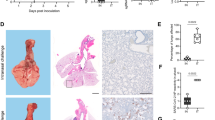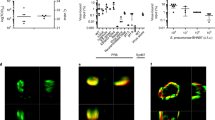Abstract
Summary: Infant rats infected with influenza A virus, Sendai (parainfluenza 1) virus or rat coronavirus were used to determine whether viral infection increases the intensity of nasal colonization with Haemophilus influenzae type b (HIB). Intranasal inoculation of HIB in rats previously infected with each of these viruses resulted in nasal HIB titers at least 100-fold higher than those for controls during the first 2 wk after HIB inoculation, and as much as 10,000-fold higher during the first week. Children with cough, sneezing, or rhinorrhea could be effective disseminators of HIB if they were as heavily and persistently colonized as these virus-infected animals.
Similar content being viewed by others
Article PDF
Author information
Authors and Affiliations
Rights and permissions
About this article
Cite this article
Michaels, R., Myerowitz, R. Viral Enhancement of Nasal Colonization with Haemophilus influenzae Type b in the Infant Rat. Pediatr Res 17, 472–473 (1983). https://doi.org/10.1203/00006450-198306000-00009
Issue Date:
DOI: https://doi.org/10.1203/00006450-198306000-00009
This article is cited by
-
Impact of antibacterials on subsequent resistance and clinical outcomes in adult patients with viral pneumonia: an opportunity for stewardship
Critical Care (2015)
-
UnencapsulatedHaemophilus influenzae — What kind of pathogen?
European Journal of Clinical Microbiology & Infectious Diseases (1988)



